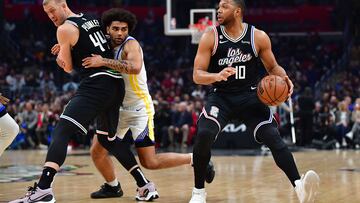Why did the Los Angeles Clippers waive Eric Gordon?
Not even six months ago, the Clippers made all kinds of moves to secure the services of Eric Gordon. Now, they’re letting him go. So, the question is, ‘why?’

If even you’re a casual fan of the NBA, you will know that nothing is ever certain when it comes to trades and transactions. Here today and gone tomorrow is the way of the league and that’s precisely what we’ve just witnessed in Los Angeles.
Clippers waive Eric Gordon
According to reports on Wednesday, the Los Angeles Clippers waived guard Eric Gordon. Now, if you’re not a Clippers fan or someone who at the least follows the NBA closely, we imagine that may mean little to you. On the other hand, there is no investment whether sporting or otherwise that once made is rescinded just months later without raising an eyebrow. With that in mind, one has to admit that it’s rather strange that the Clippers opted to let go of a player who they acquired less than five months ago. Even more so when we consider that they traded guards Luke Kennard and John Wall for Gordon, and in the process surrendered the swap rights that allowed the Houston Rockets to move up from No. 30 to No. 20 in last week’s NBA Draft, allowing them to select the highly regarded forward Cam Whitmore.
The obvious question: Why did the Clippers waive Eric Gordon?
Money. When all is said and done, the Clippers opted to part ways with Gordon because they saved a whole lot of cash. How much are we talking about? Roughly $110 million if reports are to be believed. Indeed, the Clippers’ projected tax bill went from a whopping $169 million to not so whopping $59 million according to reports. Now, you might be wondering how did the LA-based franchise get there in the first place and the answer is simple, though not sensible. For some time now, the Clippers have spent big and that in turn has drawn the focus of both the league and the player’s association. So much so in fact, that the most recent iteration of the Collective Bargaining Agreement could be described as one that specifically factors in the Clippers, with its ramped-up roster restrictions, something which has placed the franchise in repeater tax. To be clear, Gordon’s contract would have put them $39 million over the tax limit of $165 million. Over and above that fact, it’s also important to remember that for every $5 million above the limit, the tax rate increases, and even more so for teams that are repeat ‘offenders.’
So, what’s the Clippers’ situation?
Rather than go into a breakdown of the mathematics of it all, let’s keep things simple. As mentioned above, the taxation increases incrementally for every $5 million that a team goes beyond the tax limit. Now, we’ve already established that Gordon’s contract was just shy of $40 million over the limit, which means we’ve got 8 increments of five. So that we’re clear, the first of those would have cost the Clippers $12.5 million ($2.50 per dollar). We’ll allow you to do the math for the rest, but by the time we get to the end of it, we’ve got a figure of roughly $168.75 million, which as you can probably agree is a lot of money.
With Gordon out of the picture, the Clippers now stand at $18 million past the limit. What that means is that the first $15 million over their tax limit will cost them $43.75 million ($12.5 million + $13.75 million + $17.5 million), and the final $3 million over the tax would cost them $12.75 million. That adds up to $56.5 million. While there are some inaccuracies in these calculations e.g. Gordon’s salary is not precisely $21 million but rather $20,917,902, the point is a lot of money has been saved. Of course, this is a drop in a pond when we consider that we still have no concept as to what the Clippers intend to do in the market this offseason, and how much it will cost them. Nonetheless, it’s still a smooth move. Ultimately, who can say whether Gordon’s departure was about bumping the salaries of existing players, or freeing up space for players who they plan to acquire? Whatever the case, what we can say is that the Clippers have primarily been trying to build a “win now” team i.e., this most recent maneuver isn’t necessarily in keeping with that. Watch this space.








